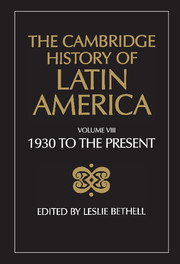Book contents
3 - Uruguay since 1930
from PART ONE - ARGENTINA, URUGUAY AND PARAGUAY
Published online by Cambridge University Press: 28 March 2008
Summary
‘In no other country do people live as we do … no other people on earth currently enjoy achievements such as ours’. Thus, in the course of a speech in 1949, did President Luis Batlle Berres express euphoric sentiments of satisfaction with the state of the Uruguayan nation. They were not necessarily shared by all his listeners, but during the following decade the notion that ‘como el Uruguay no hay’ (there's nowhere like Uruguay) was quickly absorbed into national mythology. As late as the mid-1960s Uruguayans might still cling to the belief that they were citizens of an exceptional country, blessed (unlike their neighbours) with the capacity to achieve political stability, as well as prosperity and social justice. Such an optimistic and complacent view was generally shared by external observers. But in reality Batlle Berres' statement had lost all meaning, except perhaps in an ironic sense. At mid-century Uruguay had fully recovered from the authoritarianism of Gabriel Terra in the 1930s and was now engaged, in the new age of import-substitution industrialization, in an attempt to re-establish and extend the political and social institutions of the batllista system of the pre-1930 period. The nation turned inwards, as if it preferred to live on the strength of a legend, choosing to enjoy a comfortable present rather than to contemplate an uncertain future. The consolidation of the new ideology, neo- batllismo, was facilitated by international changes of which Uruguay was a passive and, in the short term, favoured beneficiary.
- Type
- Chapter
- Information
- The Cambridge History of Latin America , pp. 195 - 232Publisher: Cambridge University PressPrint publication year: 1991

